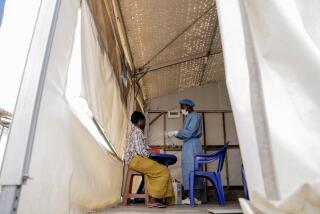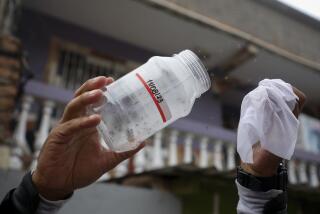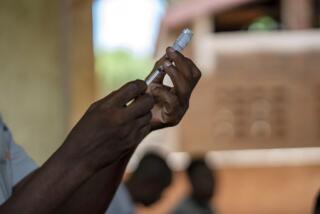Vaccine Shown to Be Effective Against Malaria
- Share via
South American scientists report today the first successful clinical trial of a vaccine against malaria, the tropical scourge that kills 3.5 million people worldwide each year and affects 100 times that many.
The need for a malaria vaccine is considered particularly urgent now because the malaria parasite is increasingly resistant to the drugs used to control it and measures to eradicate the mosquitoes that can spread the disease have reached their maximum efficiency.
Dr. Manuel Elkin Patarroyo of Hospital San Juan de Dios in Bogota, Colombia, conducted a controlled trial of the inexpensive new synthetic vaccine in 1,548 volunteers, half of whom were given the vaccine and half a placebo.
He reports in the international medical journal Lancet that the vaccine produced a reduction of nearly 40% in the overall incidence of malaria, and still greater reduction in two groups at particular risk, children under 4 (77%) and adults over 45 (67%). Those results are encouraging because, in some areas of the world such as Gambia, fully a quarter of children die from malaria.
“This is a fairly impressive study. No other vaccine has been shown to be protective in the field,” said Dr. Carter Diggs, a preventive medicine specialist who serves as a malaria consultant for the U.S. Agency for International Development. “The most important aspect is that it breaks new ground.”
Patarroyo’s vaccine has “enormous potential and significance,” said Dr. Renato Gusmao of the Pan-American Health Organization. “We are very enthusiastic about this . . . fantastic lifesaver.”
But researchers cautioned that they are not sure how effective the vaccine will be in Africa, where the infection rate is much higher. A trial of Patarroyo’s vaccine being conducted in Tanzania under the auspices of the World Health Organization may answer that question. The U.S. Army is conducting safety trials of the vaccine in the United States.
The vaccine is produced from chemically synthesized proteins that mimic the structure of several proteins produced by the malaria parasite while it is active in the human bloodstream. When injected into a person, the synthetic proteins stimulate the body to produce antibodies and, the scientists believe, provide a certain amount of protection against malaria infection.
The vaccine has been shown in a number of previous studies to be safe and to produce antibodies against the parasite.
Patarroyo and his colleagues conducted the test in eight small communities along the La Tola River on Colombia’s southern Pacific coast, a region where malaria was endemic and no organized system of medical care was previously available. Subjects received three doses of the vaccine, getting the second one a month after the first and the last five months later. Field workers visited each house in the region every month for a year to identify cases of malaria.
Among the 738 people who received the vaccine, there were 168 cases of malaria in 152 individuals. (Some patients showed symptoms of the disease twice during the one-year study.) Among 810 who received a placebo, there were 297 cases among 242 individuals. The vaccine thus reduced the incidence by almost 40%. But the degree of protection was higher in young children and older adults.
The number of cases of malaria observed in the study was too small to provide a definitive answer about the vaccine’s effectiveness, Gusmao cautioned. The data will be combined with as-yet unpublished results from similar trials in Venezuela, Ecuador and Brazil to give a clearer picture of its utility, he added.
More to Read
Sign up for Essential California
The most important California stories and recommendations in your inbox every morning.
You may occasionally receive promotional content from the Los Angeles Times.













